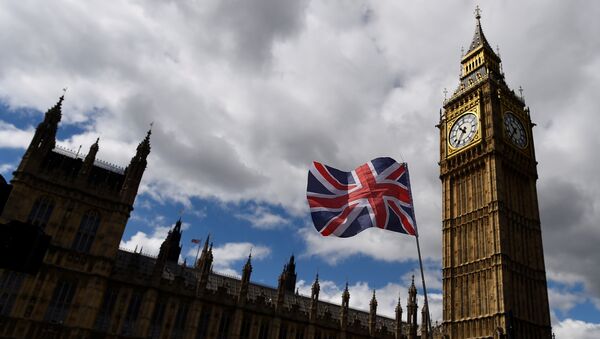Kristian Rouz – UK budget deficit rose in June due to a more than a 50-percent increase in government borrowing year-on-year, resulting in the opposition Labour party harshly criticising the ruling Tory-Democratic Unionist Party (DUP) coalition as ‘failing government’. The widened budget deficit has further fuelled the austerity debate, putting into question the efficiency of the cabinet’s most recent spending cuts, and exacerbated the concerns of household incomes, consumer confidence, and economic growth.
Treasury Chancellor Philip Hammond, however, expressed his reluctance to soften his stance on fiscal policy, having said that UK governmental debt is ‘too high’. Her Majesty’s Treasury said in a statement that it is working on a “credible fiscal plan” that would enable “sound public finances”, whilst contributing to a “stronger economy”.
The decline in tax receipts stems from the slowdown in the UK economic growth in the recent months, and higher taxed and lower budget spending, known as austerity measures, are not helping growth any longer. The Treasury, therefore, will have to provide a fiscal stimulus to the economy, thus going even deeper into the borrowing territory in the coming months, whilst the BOE will have to raise rates due to the gilt market dynamics.
All this means the UK state finances are entering the muddy waters of higher uncertainty, and it is unknown when the borrowing spree will bottom out. Only a stronger economic growth will allow for an improvement in the budget situation, but there is currently little certainty, when the economy will start accelerating.
The budget deficit is projected to widen due to a rise in government borrowing to a total of £58 bln this year compared to last year’s total borrowing of £46 bln.
“It is now looking likely that the deficit will rise this year for the first time since 2012-13,” Phil Shaw of London-based asset management company Investec said. “Unless there is a sensible public debate over the UK’s fiscal challenges, the government will face an uphill task in providing a coherent response to deliver sustainable public finances,” he added.
In the first quarter of fiscal year 2017-2018, Her Majesty’s government borrowed £22.8 bln, which is not much compared to previous years, but the rising budget deficit is a disturbing development. In 2009-2010, the government’s net borrowing was as high as £150 bln per fiscal year, meaning the current projections of £58.3-billion borrowing for this year are relatively low. Yet, a realignment in the UK broader economic policy is crucial.
“Looking beyond the current financial year, we would expect the decline in the budget deficit to resume if current tax and spending plans are maintained. This should give the chancellor some room for manoeuvre in his autumn budget to ease up on austerity in priority areas like health, social care, policing and housing investment,” John Hawksworth of PwC said.
There is some hope for a quick rebound in the UK economy and the government’s budget, though. In June, inflation surprisingly fell from 2.9 percent to 2.6 percent, encouraging a better consumer sentiment, and retail sales posted an improvement. Coupled with the still robust gains in individual and capital tax receipts, as well as a solid labour market, Chancellor Hammond’s task of introducing a sound fiscal policy is markedly easier than the fiscal data suggests.








